Ensemble
Donate
Newsletter
Follow US
2006-10-29: Northern Stars: Baltic Voices II
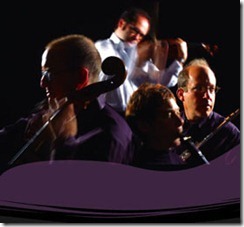
Sunday, October 29, 2006 at 7pm
Nordstrom Recital Hall, Benaroya Hall
Welcome seven world-class composers following their appearances with SCP on Saint Paul Sunday and at Icebreaker as they return to open our season with new works of brilliance and beauty.
All works are world premieres written in 2006 as SCP commissions.
PROGRAM
Sergei Dmitriev (Sweden) · Veloprobeg ("A Cycle Race")
Pär Lindgren (Sweden) · Aliti ("Breaths")
Uljas Pulkkis (Finland) · Trail
Onutė Narbutaitė (Lithuania) · Le linee e I contorni ("Lines and Contours")
Helena Tulve (Estonia) · stream
Peter Bruun (Denmark) · Breve til havet ("Letters to the Ocean")
Igor Kefalidis (Russia) · Peer to peer, op. 68
Program Notes
PROGRAM NOTES
by Dr. Elena Dubinets
Northern Stars: Baltic Voices II
Sergei Dmitriev was born in 1964 in Novosibirsk, Russia, and moved to Moscow at the age of six. There he graduated from the Tchaikovsky State Conservatory, in 1991, where he studied composition with professors Albert Leman and Nikolai Korndorf. In 1992, Dmitriev moved to Sweden and began postgraduate work at the Royal College of Music in Stockholm, studying composition with Professor Sven-David Sandström; he graduated there in 1997, and became a Swedish citizen in 1998.
In his music, Dmitriev strives to unite the Russian dramatic shape with aspects of Western postmodern timbres, as well as to emphasize a processional sensation through the timing of the music. He combines different stylistic directions and genre elements (contemporary music, jazz, pop, rock and folk) with one purpose: the creation of an intelligible and affecting new serious music.
In 1997, Dmitriev's music was featured on Swedish Radio in two concert programs with the Swedish Radio Symphony Orchestra (the works Magnifico and Circulation). In 1998, Dmitriev received first prize in the 20th Luigi Russolo Competition in Varese, Italy, for his work CornDoRF, for French horn and electronics. The work was performed in Seattle in 2001. His work Mirages, for saxophone quartet, was runner-up at the 4th Tokyo International Competition for Chamber Music. In 2000, the Youth Gothenburg Orchestra performed his work Dreams from My Childhood, commissioned by the Swedish Concert Institute. From 2003 to 2005, he collaborated with the Barents International Chamber Choir, producing the works That Morning, That Joy and We Are Glad for a cappella choir with conductor Erik Westberg. In October 2006, his Circulation was performed in Russia by Yekaterinburg State Philharmonics, with conductor Dmitry Liss.
A Cycle Race
The composer recommends treating the title of the piece literally as well as allegorically: as an intense "cycle race" through the cycle of life.
— Sergei Dmitriev
Pär Lindgren (b. 1952) studied composition at the Royal College of Music in Stockholm. He has been a member of the teaching staff there since 1980, and in 1998 was appointed professor of composition. In his output as a whole, one can see how groups of works are united by certain extra-musical themes which provide a platform for his creativity. Many works are based on visual forms, Arabic patterns, African music, and Swedish folk music. Another group of works has found inspiration in nature, not for descriptive purposes, but as abstracted patterns. Lindgren prefers to write for orchestra or for large chamber music combinations, and his music can be characterized as an investigation of the body of sound. The composer's works can be described more clearly with the help of physical metaphors: they take on sculptural features, and the movements are refined and well choreographed within a clearly defined harmonic framework.
Aliti
The piece is a mixture of Arabic music and Swedish folk music that, believe it or not, have a lot of common pitch connections. The title is Aliti ("breaths" in Italian), and the piece is about breathing together.
— Pär Lindgren
Uljas Pulkkis (b. 1975) graduated from the composition department of the Sibelius Academy of Music in Helsinki in 2002. Among other awards, he has received the Grand Prize in the Queen Elisabeth International Composition Competition (1999) and first prize at the International Rostrum of Composers (2001). His music has been heard at the Warsaw Autumn festival, the Ung Nordisk Musik festival in Oslo, the Torino Biennale in Italy, and at many other international contemporary music events. Pulkkis writes mostly orchestral, vocal, and chamber works.
Trail
The title of my new composition is Trail. The title refers to the echo-like trails of the main melodic line, which can be heard very clearly in the beginning of the work. The idea for this kind of texture came to me from the world of electronic music. Before this work I wrote a clarinet concerto in which I tried to imitate different kinds of audio effects with an orchestra. After that I was interested to try the same idea with a chamber ensemble. The tonal material in Trail is generated from two different two-octave scales. The idea of the scales is to avoid the pitch C-sharp. This very pitch is heard in the end of the work clearly in the octaves. Whether you have perfect pitch or not, the sense of an entirely new pitch is very strong. The use of register is also carefully thought. Nearly half of the work, all the instruments are playing in the same register. Places where the register really opens thus give a stronger effect.
Since I heard Seattle Chamber Players play my work a couple of years ago, I really wanted also to give solos to players. The longest solo in the work is for alto flute; the instrument has a rich and lovely sound, but is also very quiet. The overall character is light and playful.
— Uljas Pulkkis
Onutė Narbutaitė (b. 1956) graduated from the Lithuanian Academy of Music in 1979. In 1997, she was awarded the Lithuanian National Award in Culture and Music for her oratorio Centones meae urbi. Her works have been commissioned by many international festivals, including the Schleswig-Holstein Musik Festival, the Helsinki Festival, A-Devantgarde, and Kaustinen XX Chamber Music Week. Her works have also been performed at Warsaw Autumn, Internationales Festival für neue Musik (Heidelberg), De Suite Muziekweek (Amsterdam), and at many other venues and festivals. Narbutait?'s works show two principal trends that often coexist in one piece: an inclination towards inventive construction; and references to different styles from the past, apparently in response to the postmodern epoch.
Le linee e i contorni
Le linee e i contorni (Lines and Contours, 2006) for flute, clarinet, violin and cello was commissioned by the Seattle Chamber Players. This opus concludes the 'Italian' triptych, into which as if of their own accord the three recently written works align. Formally, they share some nuances of musical language, but their kinship is waned by different contexts. Also, they are united by a hardly describable, but I hope perceptible, spiritual bond. The three works are somewhat reminiscent of traditional 'iconic' triptychs, with the grand centrepiece—in this case La barca (A Boat, 2005) for quadruple symphony orchestra, commissioned by the Musica viva concert series of the Bavarian radio—framed by two smaller (i.e., chamber) sidepieces: String Quartet no. 4 Drappeggio (Drapery, 2004), commissioned by the Klangspuren Festival and written for the Arditti Quartet, and Le linee e i contorni. Since music evolves in time, in the overall concept of the triptych Drappeggio (Drapery) acquired the role of introduction, and Le linee e i contorni (Lines and Contours) became an epilogue. Incidentally, all three opuses are of almost equal duration. Both allusions to a painting and titles of works may raise visual associations, but do not necessarily indicate that the music is representational.
A triptych of this kind, it goes without saying, would be difficult to perform on the concert stage. As a unit it could rather be seen in the mind's eye—as a natural continuation of creative ideas born out of similar impulses. Though different in terms of both instrumentation and expression, these opuses are linked not only by a few musical elements, but also by some nonmusical 'Italian' inspirations. They are quite important, though not exclusive, since it is impossible to locate and strictly confine the field of inspirations. The territories of Drappeggio and La barca could be named 'Venetian,' while patterns in Le linee e i contorni, in my opinion, echo with 'Florentine' ones, affected by the artistic radiance of Giotto and Quattrocento painters. Differently from the orchestral work, this opus returns to explicit and palpable melodic lines, while the string quartet's rippling draperies and shadows are replaced by much thinner and clear-cut counterpoints and textures. Architectonics of this opus stem from conventional and basic elements: melodic lines, harmonies, 'modulations' and repetitions. Sonoristic-technological analysis of instruments, so characteristic of music for similar chamber ensembles, was consciously put aside. And what was there beyond the staves that was not put aside? A tiny ray of light (la chiarezza); an indication of thirst; a tender play; a rippling of the reminiscent mind. This is how the contours of the music emerged—not so topical, yet distinctively 'timeless.'
— Onutė Narbutaitė
Helena Tulve (b. 1972) studied composition at the Tallinn Secondary Music School and then, from 1989 to 1992, was the only student of Erkki-Sven Tüür at the Estonian Academy of Music. Tulve continued her composition studies at the Paris National Regional Conservatory under Jacques Charpentier; she graduated with the Premier Prix in 1994. From 1993 to 1996, she studied medieval church chant and traditional music at the Paris National Higher Conservatory of Music and Dance. She has participated in summer courses on new music held by György Ligeti and Marco Stroppa, and was selected by a jury at IRCAM in Paris to take part in their computer music course in 2001. Since autumn 2000, she has been a lecturer at the Estonian Academy of Music.
Tulve belongs to the younger generation of Estonian composers who create music which focuses on sound and sonority. What gives Tulve's music its singularity and power of suggestion is the fortunate combination of analytical exactness and intuitive shaping of imagery. The atmosphere of her compositions suggests the metaphysical and existential.
At the 1998 International Rostrum of Composers in Paris, Tulve's à travers was acknowledged as the recommended work in the category of composers under 30. Her orchestral composition Sula later won the UNESCO`s International Rostrum of Composers in Paris in 2004. In January 2005, Estonian Radio honored Helena Tulve with the title of the Musician of the Year. Her first album, Sula, was released by Estonian Radio in June 2005.
Helena Tulve's music has been performed in many European countries, in the United States and Canada, and at numerous festivals of contemporary music: NYYD Festival (Estonia), BIG Torino (Italy), Warsaw Autumn (Poland), Vancouver New Music (Canada), Gaida Music Festival (Lithuania), Music of Friends (Russia), Musica Nova (Poland), Les Boréales (France), Maerz Musik (Germany), and Klangspuren (Austria).
stream
… unknown path, slow deviation, quiet fluctuation, unexpected currents, grains in the quiet wind, flux and reflux, airwaves, a melody …
stream is dedicated to Seattle Chamber Players.
— Helena Tulve
Peter Bruun (b. 1968) studied composition in private classes with Niels Marthinsen from 1989 to 1991, in his birth town, Århus. In the same period, he studied philosophy at the University of Århus. In 1997, he graduated from the Jutland Academy of Music in composition and music theory. His composition teachers at the academy included Karl Aage Rasmussen, Per Nørgård, Hans Abrahamsen and Bent Lorentzen. Since 1997, Bruun has been working as a freelance composer and has also taught music theory at the academies in Esbjerg, Århus and Copenhagen. From 2001 to 2004, he was artistic director of the Esbjerg Ensemble.
Bruun has composed music within most musical genres. However, more than half of his works involve text in one way or another, including chamber music with voice, music for choir, and music theater. Throughout his entire production, one ambition prevails: the belief that it is still possible to find new, personal ways of working with tonality, rhythm, harmony, and melody. Some influences from rock/pop music and from ethnic music are evident.
During the recent years, music theater has played an important role in Bruun's work. Together with the Danish writer Ursula Andkjær Olsen, stage director Ditte Bjerg, and set designer Filippa Berglund, he created the one-woman cabaret opera Miki Alone—Seven Songs for a Mad Woman and the theatrical performance piece The Art of Choosing—The Right Melody.
Peter Bruun has an ongoing cooperation with the Copenhagen-based chamber ensemble FIGURA, for whom he composed Miki Alone and several other works. He occasionally performs together with FIGURA as a singer of his own music.
Breve til havet
Breve til havet (Letters to the Ocean) is in four movements: four letters to the ocean. The first movement is short and quite fast, with a metronome-like drumbeat interrupted by short references to the second and the fourth movement. The second movement is the longest—melodious passages change with a more "bumpy," polyrhythmic music. The third movement is slow and based on repeated chords with embellishments. The fourth movement is short and based upon a song I wrote to a text by the English author Gerard Manley-Hopkins: "Heaven-Haven." ("I have desired to go / where springs not fail / to fields where flies no sharp and sided hail / and a few lillies blow. // And I have asked to be / where no storms come / where the green swell is in the havens dump / and out of the swing of the sea.") The title of the piece is by Danish writer Ursula Andkjær Olsen, taken from our cabaret opera Miki Alone: "Recall the ocean, when night is falling upon your bed. … You could write a letter to the ocean. …"
— Peter Bruun
Igor Kefalidis (b. 1941) is a composer and pianist and member of the Union of Russian Composers; of Associations of Contemporary and Electronic Music (Moscow); and of Studio LIGYS (Paris). He studied at the Moscow State Conservatory with professors Samuil Feinberg and Yakov Zak (piano) and Professor Rodion Schedrin (composition). As a pianist, he has traveled around the world performing both classical and contemporary music, including his own music. Kefalidis has always, since the beginning of his artistic career, been actively involved in the musical life of Moscow and instrumental in arranging special projects, including international ones.
Kefalidis' capabilities as a composer are demonstrated by innovative approaches in every opus, with the creation of unique constructive and sound solutions, and with taking full advantage of contemporary composition techniques. In the last decades, his major interests became concentrated around electronic compositions. An important part of his artistic biography is a long-term cooperation with Moscow Satire Theater and with the Russian movie industry.
Igor Kefalidis' compositions have been performed in many cities in Russia and the former U.S.S.R., as well as in Germany, Austria, England, France, Italy, Belgium, Spain, Sweden, Finland, Israel, the United States, Australia, Japan, Cuba, Czechoslovakia, Bulgaria, Yugoslavia, Hungary and Brazil.
Peer to Peer
The composition Peer to Peer models a communicative system whose members together and equitably use pitch and metro-rhythmic resources provided by the electronic component, being at the same time within a complicated collateral subordination.
— Igor Kefalidis
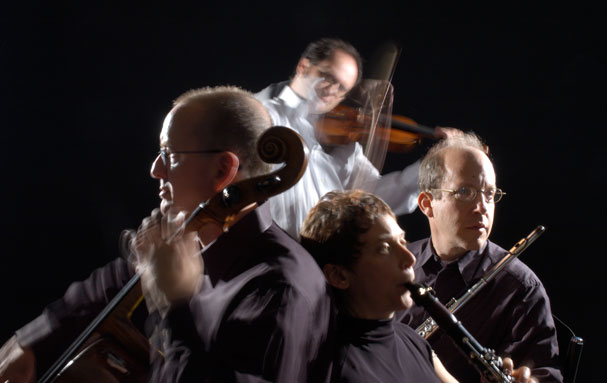
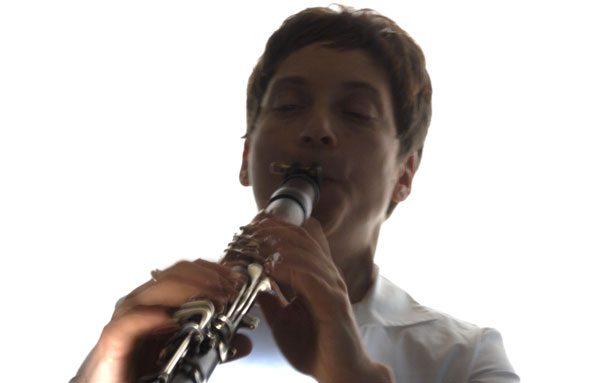
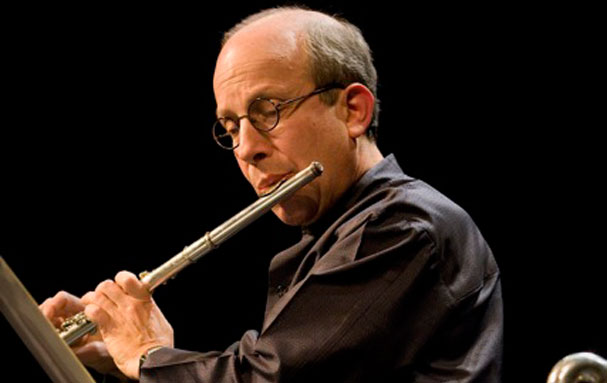
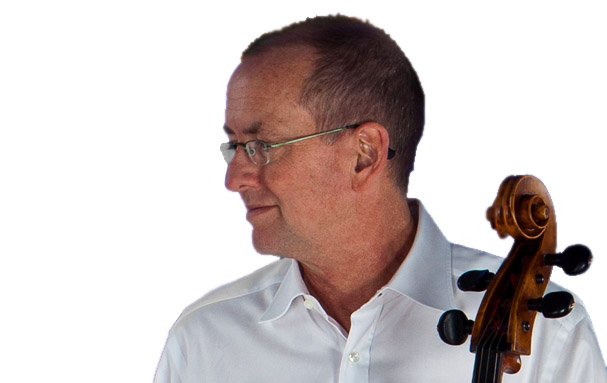
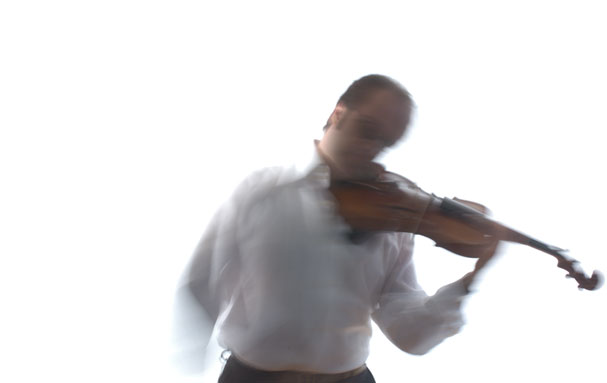
 Laura DeLuca
Laura DeLuca Mikhail Shmidt
Mikhail Shmidt David Sabee
David Sabee Paul Taub
Paul Taub